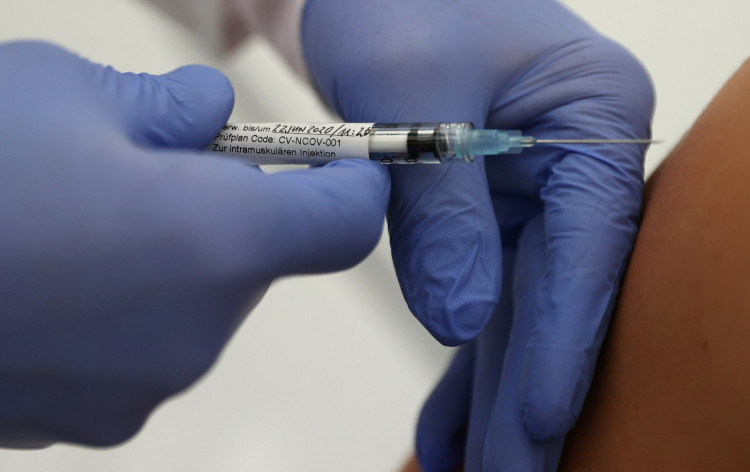On the evening of June 23, the Institute of Medical Biology under the Chinese Academy of Medical Sciences announced that an inactivated COVID-19 vaccine candidate it developed was about to enter phase-3 international clinical trials in the United Arab Emirates.
So far, six COVID-19 vaccine candidates have been approved for clinical trials in China, among which, three are about to enter phase-3 clinical trials. On June 19, the Ministry of Science and Technology reported China accounted for 40 percent of the total vaccines in clinical trials worldwide.
One of the vaccine companies, Sinovac Research & Development, claims it will implement a clinical trial of its inactivated Covid-19 vaccine candidate in July, involving 9000 volunteers in Brazil. The firm expects to have trial results within two months.
According to Article 20 of the Vaccine Administration Law of the People's Republic of China, the medical products administration of the State Council may conditionally approve vaccine registration applications for vaccines urgently needed to respond to major emergent public health crises if benefits outweigh risks. On June 18, National Health Commission Ministry of Science and Technology allied with Ministry of Industry and Information Technology, State Administration for Market Regulation and National Medical Products Administration and issued general requirements for bio-safety of vaccine production under emergent public health incidents.
Final Beidou satellite launch extends global reach of Chinese navigation system
The 35th and final satellite of the Beidou Navigation Satellite System (BDS) was successfully launched into orbit on Tuesday morning (Beijing Time) from Xichang, Sichuan Province. With an investment of 20 years and over US$10 billion dollars, BDS provides coverage to 120 countries and regions. The launch on Tuesday was a third-generation BDS satellite, following the BDS-1, which completed launch in 2000 mainly for users in China and BDS-2 deployment in the Asia-Pacific region since 2012.
When fully completed, BDS will provide an alternative global navigation satellite system comparable to the United States' GPS, Russia's GLONASS and the European Galileo systems. Compared to GPS accuracy of 30 centimeters, BDS would offer an open service with an accuracy of 10 centimeters.
Over 70% of smart phones in China including Huawei, MIUI, OPPO, Vivo and Samsung support BDS. The system has been integrating with various sections of Internet, big data and artificial intelligence businesses to construct an emerging industry and plans to incorporate the system into standards of the International Civil Aviation Organization. China Satellite Navigation System Management Office expects BDS to generate over 400 billion RMB (US$56 billion dollars) by the end of 2020.
Four Chinese cities upgrade administrative identity
In the past week starting from June 19, the State Council consecutively approved four cities in China, Changchun (Jilin province), Chengdu (Sichuan province), Yantai (Shandong province) and Xingtai (Hebei province), to administratively convert their rural counties into city districts, which means the counties will be governed by local cities.
Many cities have followed the steps of the four first-tier cities, Beijing, Guangzhou, Shanghai and Shenzhen, towards urbanization. Over the past ten years, China has converted a total of 141 counties and meanwhile added 110 city districts. By the end of 2019, China had 1,323 counties and 965 city districts.
As the trend continues, the countryside economy would be affected by urban economic forces that focus on infrastructure, construction and improvement of public service, with the continual reduction of rural farmer population.
Pinduoduo rises to be the new e-commerce star
The share price of Pinduoduo, a new e-business platform that targets third-and-fourth-tier cities in China, has been continually rising and in June reached US$104.9 billion dollars. On the previous trading day of the U.S. stock market, Pinduoduo hit a new record of US$87.58 dollars.
Analysts attribute Pinduoduo's share increase partially to its successful subsidy strategy in the Shopping Festival on June 18, which was a fierce battle among various e-business commerce platforms including Alibaba. By midnight of June 19, Pinduoduo GMV increased by 300% year-on-year. The major reason, however, might be its stable growth in the first season of 2020.
According to Pinduoduo's first quarter finance report, the number of active consumers on its platform reached 628 million, a year-on-year increase of 42%, versus 728 million active consumers on Alibaba. From April to present, its stock price has increased by 143%, while Tencent and Alibaba have risen by 21% and 10%, respectively.
In October, 2019, Colin Huang (Huang Zheng), Founder and CEO of Pinduoduo, announced Pinduoduo GMV has exceeded JD in the quarter, which was two years ahead of his growth expectations.
China auctioned the third batch of special bonds for the COVID-19 pandemic
Ministry of Finance in China auctioned 70 billion yuan (US$10 billion) of special treasury bonds on Tuesday, the third batch of special treasury bonds package worth 1 trillion yuan (US$141 billion) in total to help fund economic stimulus in the wake of the coronavirus pandemic.
The first batch of special bonds, worth 50 billion yuan (US$7 billion), started sales on June 18 and second batch worth an equal amount was delayed and will begin on July 1. Sales will stretch through the end of July.
The third batch will have a 10-year term, which accounts for 70 percent of the special treasury bonds. The first batch will have a maturity of five years, which accounts for 20 percent of the total bonds. The remainder, the second batch, will be seven-year bonds. The bond rates differ within the range of 2.41 to 2.77 percent annually.
Different from regular book-entry treasury bonds, special treasury bonds for the COVID-19 pandemic cannot be redeemed in advance. Investors can exchange through banks where the trading price would fluctuate along with the market price.
Individual investors can purchase the special treasury bonds in agent banks, which include Industrial and Commercial Bank of China (ICBC), Agricultural Bank Of China (ABC), China Construction Bank (CCB), China Merchants Bank(CMB), Bank of Beijing and Bank of Nanjing.





